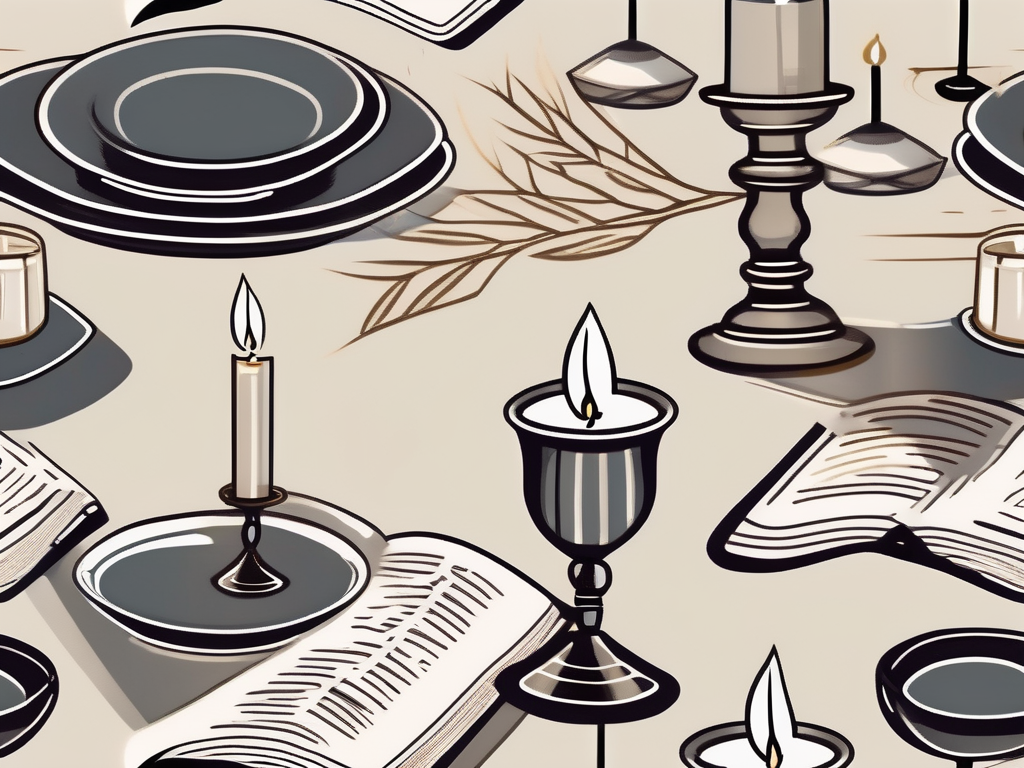Islam is a religion that dates back to the 7th century and has since grown to become one of the world’s major religions. With over 1.8 billion followers worldwide, it is important to gain a deeper understanding of the core beliefs and rich traditions that make up this faith. In this article, we will explore the fundamental principles of Islam, the significance of prayer and fasting, the moral and ethical code, and the role of women in this vibrant religion.
Understanding the Core Beliefs of Islam
At the heart of Islam lie a set of core beliefs that guide the lives of its followers. These beliefs form the foundation of the religion and shape its practices. One of the key beliefs in Islam is the concept of Tawhid, which emphasizes the oneness of Allah, the supreme and only God. Muslims believe that there is no deity worthy of worship except Allah and that He has no partners or associates.
Islam places great importance on the belief in the prophets and divine books. Muslims revere Prophet Muhammad as the last and final messenger of Allah, following in the footsteps of earlier messengers like Moses and Jesus. The Quran, considered the definitive word of Allah, serves as the principal holy book in Islam and provides guidance for all aspects of life.
The concept of Tawhid is deeply ingrained in the Islamic faith. It signifies the absolute unity and uniqueness of Allah, highlighting the belief that there is no god but Allah. This belief is not only a theological doctrine but also a practical guide for Muslims in their daily lives. It reminds them to direct all their worship, prayers, and devotion solely towards Allah, recognizing His supreme authority and power.
Furthermore, the belief in prophets and divine books is an integral part of Islamic theology. Muslims believe that Allah has sent numerous messengers throughout history to guide humanity towards the right path. These messengers, including Prophet Muhammad, were chosen by Allah to deliver His message to the people. They were individuals of exceptional character and moral virtue, who dedicated their lives to spreading the teachings of Allah.
The Quran, the holy book of Islam, is considered the ultimate source of guidance for Muslims. It is believed to be the direct word of Allah, revealed to Prophet Muhammad over a period of 23 years. The Quran covers a wide range of topics, including theology, morality, law, and guidance for personal conduct. Muslims regard it as a timeless and universal source of wisdom, applicable to all aspects of life.
Islam encourages its followers to study and reflect upon the teachings of the Quran, seeking guidance and inspiration from its verses. Muslims strive to live their lives in accordance with the principles and values outlined in the Quran, aiming to achieve spiritual growth and a closer connection with Allah. The Quran serves as a source of comfort, solace, and guidance for Muslims in times of joy, sorrow, and uncertainty.
In addition to the Quran, Muslims also hold the previous divine books, such as the Torah and the Bible, in high regard. They believe that these books were also revealed by Allah to guide specific communities and convey His message to the people of their time. However, Muslims consider the Quran to be the final and most comprehensive revelation, superseding all previous scriptures.
Overall, the core beliefs of Islam revolve around the oneness of Allah, the belief in prophets and divine books, and the guidance provided by the Quran. These beliefs shape the worldview of Muslims and influence their attitudes, behaviors, and interactions with others. They provide a strong moral and ethical framework for individuals to lead a righteous and purposeful life, striving to please Allah and attain salvation in the hereafter.
The Role of Prayer in Islamic Tradition
Prayer plays a central role in the lives of Muslims and is considered one of the Five Pillars of Islam. Muslims are required to perform prayer, known as Salah, five times a day. This regular practice of prayer serves as a constant reminder of their connection with Allah and their commitment to living a devout life.
In addition to the regular Salah, Muslims also engage in the practice of Du’a, which involves personal supplication and reaching out to Allah in times of need or gratitude. This form of prayer allows individuals to have a personal relationship with their creator, seeking guidance, forgiveness, and blessings.
When Muslims perform Salah, they engage in a ritualistic act of worship that involves specific physical movements and recitations. The prayer begins with the adhan, the call to prayer, which is announced from mosques or recited individually. This call serves as a reminder to Muslims to pause their daily activities and turn their attention towards Allah.
Before starting the prayer, Muslims perform ablution, known as wudu, which involves washing specific parts of the body, such as the hands, face, and feet. This act of purification is seen as a way to cleanse oneself both physically and spiritually before standing in the presence of Allah.
Once the ablution is complete, Muslims find a clean and quiet place to pray. They face the Kaaba in Mecca, the holiest site in Islam, as a symbol of unity and direction. The prayer consists of a series of physical movements, including standing, bowing, prostrating, and sitting, accompanied by recitations from the Quran. These movements and recitations are performed in a specific order and are meant to demonstrate humility, submission, and devotion to Allah.
Each prayer consists of a specific number of units, known as rak’ahs, which vary depending on the time of day. The five daily prayers are Fajr (before sunrise), Dhuhr (midday), Asr (afternoon), Maghrib (after sunset), and Isha (night). By performing these prayers at designated times throughout the day, Muslims are able to maintain a constant connection with Allah and keep their faith at the forefront of their lives.
Aside from the obligatory prayers, Muslims are encouraged to engage in voluntary prayers, known as Sunnah and Nafl prayers. These additional prayers are not obligatory but are highly recommended and can be performed at any time. They serve as a way to earn extra reward and strengthen one’s relationship with Allah.
In addition to the regular Salah and voluntary prayers, Muslims also engage in the practice of Du’a. This form of prayer is a personal and intimate communication with Allah, where individuals can express their deepest desires, fears, and gratitude. Muslims believe that Allah is always listening and that Du’a is a powerful tool for seeking guidance, forgiveness, and blessings.
During times of hardship or difficulty, Muslims turn to Du’a as a means of finding solace and seeking Allah’s help. It is a way to acknowledge one’s dependence on Allah and to seek His intervention in times of need. Muslims also engage in Du’a to express gratitude for the blessings they have received and to seek Allah’s continued favor and mercy.
Prayer in Islamic tradition is not just a ritualistic act, but a way of life. It serves as a constant reminder of one’s connection with Allah and the importance of maintaining a strong spiritual bond. Through the regular practice of Salah and the personal supplication of Du’a, Muslims strive to live a life of devotion, seeking Allah’s guidance and blessings in every aspect of their lives.
The Significance of Fasting and Pilgrimage
Two prominent practices within the Islamic faith are fasting and pilgrimage. The observance of Ramadan, a month of fasting, holds great significance for Muslims worldwide. During this time, from dawn to sunset, believers abstain from food, drink, and other physical needs. It is a time of self-reflection, increased devotion, and spiritual growth.
When Muslims engage in fasting during Ramadan, it is not merely a physical act of abstaining from food and drink. It is a deeply spiritual practice that allows individuals to detach themselves from worldly desires and focus on their relationship with Allah. The act of fasting is seen as a means of purifying the soul and seeking closeness to the divine. It is a time of heightened self-discipline and self-control, as Muslims strive to resist temptation and strengthen their willpower.
During Ramadan, Muslims also engage in increased acts of worship, such as reciting the Quran, performing additional prayers, and giving to charity. The month is seen as an opportunity for believers to deepen their understanding of the Quran and strengthen their connection with Allah through prayer and reflection. It is a time of intense spiritual introspection, where individuals assess their actions and seek forgiveness for any wrongdoings.
Another key pilgrimage in Islam is the Hajj. Each year, millions of Muslims travel to the holy city of Mecca in Saudi Arabia to participate in this religious journey. The Hajj is a time of spiritual cleansing and unity, where pilgrims strengthen their bond with Allah and seek forgiveness for past sins.
The Hajj is a deeply significant event in the life of a Muslim. It is considered one of the five pillars of Islam, which are the fundamental acts of worship that every Muslim should perform. The pilgrimage to Mecca is a physical manifestation of the unity of the Muslim ummah (community) and a reminder of the equality of all believers in the eyes of Allah.
During the Hajj, pilgrims follow in the footsteps of Prophet Muhammad and perform a series of rituals that symbolize various aspects of faith and devotion. They circumambulate the Kaaba, the sacred house of Allah, seven times, representing the unity of Muslims from all corners of the globe. They also travel to the plain of Arafat, where Prophet Muhammad delivered his final sermon, and spend the day in prayer and supplication, seeking forgiveness and mercy.
The Hajj is not just a physical journey; it is a spiritual transformation. Pilgrims leave behind their worldly possessions and don simple white garments, symbolizing purity and equality. They detach themselves from the distractions of everyday life and focus solely on their relationship with Allah. The Hajj serves as a reminder of the transient nature of this world and the ultimate goal of attaining closeness to Allah.
Upon completion of the Hajj, Muslims return to their homes with a renewed sense of faith and purpose. The experience of the pilgrimage leaves a lasting impact on their lives, reinforcing their commitment to Islam and inspiring them to live in accordance with its teachings. The memories and lessons learned during the Hajj serve as a source of spiritual strength and guidance throughout their lives.
The Islamic Moral and Ethical Code
Islam emphasizes the importance of adhering to a moral and ethical code known as Sharia. This code governs various aspects of life, including personal conduct, family matters, and business transactions. Muslims follow the concept of Halal, which refers to what is permissible or lawful, and Haram, which denotes what is forbidden or prohibited.
Sharia serves as a framework for promoting justice, kindness, and equality within the Muslim community. It provides guidance on issues such as honesty, integrity, and caring for others. Muslims strive to live their lives in accordance with this code, seeking to attain spiritual purity and harmony.
The Role of Women in Islam
Women play a vital role in Islam, despite certain misconceptions that persist in some societies. Islam promotes gender equality and grants women various rights and responsibilities. Women have the right to education, work, and own property, among other basic entitlements.
While some women choose to wear the veil as a symbol of modesty, it is essential to understand that niqab or hijab is not universally mandated in Islam. The decision to wear the veil is a personal one and varies among individuals and cultures. For some, it is seen as a reflection of their devotion and reverence for Allah, while for others, it is a cultural practice.
Women’s Rights and Responsibilities
Islam recognizes the importance of women in society and highlights their rights and responsibilities. Muslim women have the right to inherit, vote, and participate in public life. They are encouraged to seek education, pursue careers, and contribute to the betterment of their communities.
Additionally, women are integral to the family structure in Islam. They have the right to choose their spouse, maintain their own property and financial independence, and play a crucial role in raising and nurturing their children.
The Veil: Symbol of Modesty or Oppression?
The veil, often a subject of debate and misunderstanding, can be seen as a symbol of modesty or oppression. It is important to recognize that the practice of wearing a veil, whether it be the hijab, niqab, or burqa, varies across different cultures and regions. The decision to wear the veil is a personal choice made by individuals in accordance with their understanding of Islamic teachings and cultural traditions.
For many Muslim women, wearing the veil is a voluntary act of piety and a way to express their devotion to Allah. It is a symbol of modesty and a means of protection, allowing women to maintain their personal boundaries and guard against unwanted attention. It is crucial to approach the topic with sensitivity, understanding, and respect for the diverse interpretations and practices within the Islamic faith.
In conclusion, exploring the rich traditions and beliefs of the Islam religion allows us to gain a deeper appreciation for the diversity and significance of this faith. From understanding the core beliefs of Islam to the role of prayer, fasting, and pilgrimage, as well as the moral and ethical code it promotes, we can better comprehend the practices that shape the lives of Muslims worldwide. By recognizing the rights and responsibilities of women in Islam, we can dispel common misconceptions and foster a more inclusive and understanding society.












